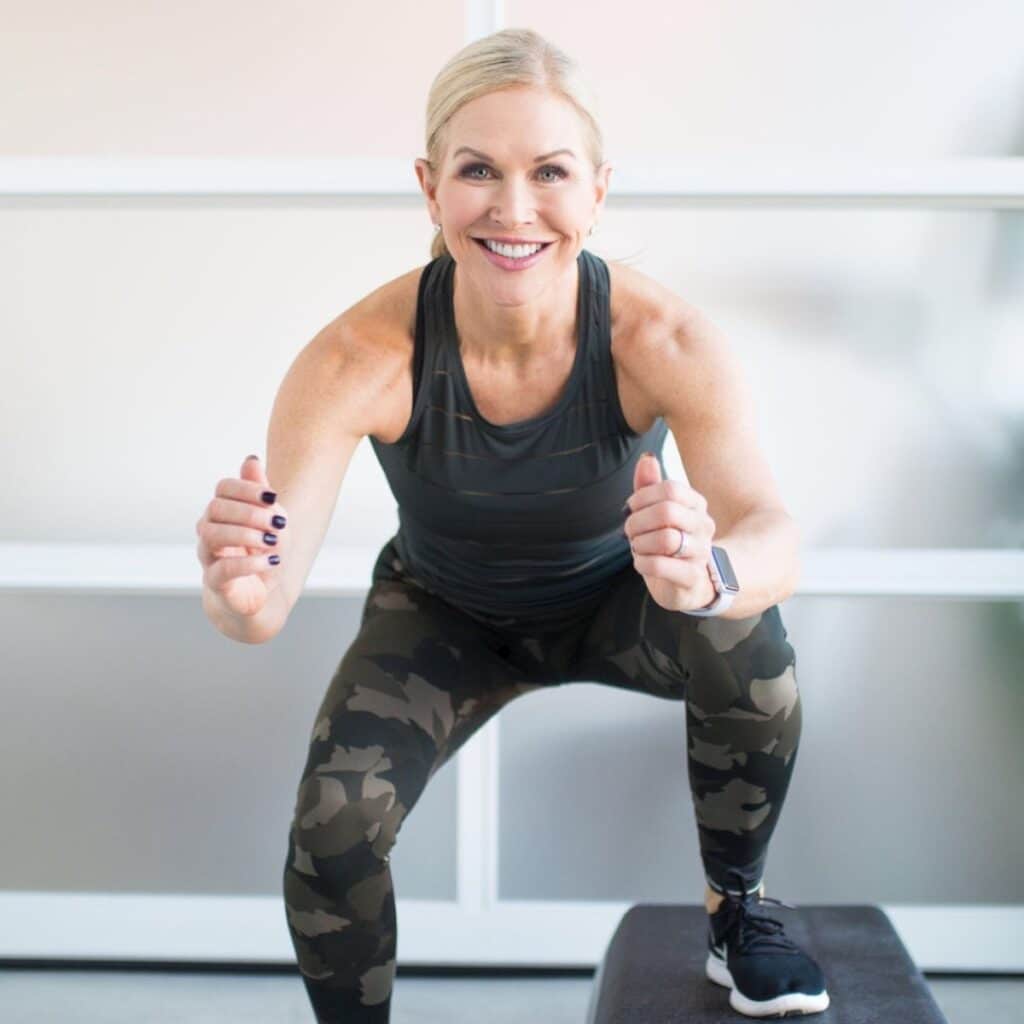This post contains affiliate links. Please see our disclosure policy.
Knee pain is real. These leg exercises for bad knees are expertly designed to help you strengthen and tone your legs with little to no strain on your knee joints.
If you have bad knees from disuse, natural aging, or a past knee injury, don’t worry—there’s still a lot you can do to build strength, keep your joints healthy and help reduce knee pain. The key is focusing on exercises that strengthen the muscles and support structures around your knees, like the quads, glutes, hamstrings, and inner thighs.
Remember, consistent strength training is one of the best ways to maintain your mobility and protect your joints as you age.
The 10 knee-friendly leg exercises below are thoughtfully chosen for building strength in your legs and the muscles around your knees without putting too much strain on the joints. These moves will keep you strong and active while being gentle on your knees.
Feel free to do a few or all of these knee-strengthening exercises—consistency is key for the best results.
Note: Always consult with a healthcare professional before starting any new exercise program, especially if you have pre-existing knee conditions or concerns.

Save This Article To Read Later
1. Walking Backwards
Walking backward is a surprisingly effective exercise for strengthening the muscles around your knees while also improving balance and coordination. Unlike forward walking, backward walking shifts the emphasis onto your hamstrings, calves, and glutes, all while engaging the muscles that support and stabilize your knees.

How to Properly Walk Backwards
Find a clear space or on a treadmill walk very slowly with controlled steps. Look over your shoulder as needed. Walk backwards for 3-5 minutes.
2. Straight Leg Raises
Performing straight leg raises are a great way to strengthen your quadriceps without putting pressure on your knees.

How to Perform Straight Leg Raises
Start by lying on your back with one leg bent and the other straight. Lift the straight leg to the height of your bent knee, hold for a few seconds, then lower it slowly. Do 15 repetitions on each leg.
3. Wall Sits
Wall sits engage your quadriceps, hamstrings, and glutes while keeping your knees in a safe, stable position.

How to Perform Wall Sits
Stand with your back against a wall and slide down into a sitting position as if you’re sitting on a chair. Hold the position for 20-30 seconds then rest 15 seconds. Then, repeat 3 or 4 more times.
4. Deadlifts
A bodyweight deadlift, also known as a good morning, is a simple yet effective exercise that targets the hamstrings, glutes, and lower back. This movement also strengthens the posterior chain, improves hip mobility, stretches your hamstrings, and helps protect your lower back from injury.

How to Perform Deadlifts
Start by standing with your feet hip-width apart and bend your knees slightly. Hinge forward at the hips, maintaining a flat back and neutral spine, as you lower your torso towards the ground, sending your hips back. Pause when you feel a stretch in your hamstrings, then engage your glutes to return to standing. Complete 15 repetitions.
5. Calf Raises
The calf raise exercise strengthens your lower legs and improves balance without stressing your knees.

How to Perform Calf Raises
Stand with your feet hip-width apart, and slowly raise your heels off the ground, balancing on the balls of your feet. Lower your heels back down slowly. Complete 15 repetitions.
6. Step-Ups with Overhead Press
Adding step-ups into your workout routine will build strength in your quadriceps and glutes while being gentle on your knees.

How to Perform Step-Ups
Using a low step or bench, step up with one foot and then bring the other foot up to join it. Step down one foot at a time. Repeat on both legs and complete 15 repetitions.
7. Clamshells
The clamshell exercise strengthens the glutes and outer thighs, which are crucial for knee stability.

How to Perform Clamshells
Lie on your side with your knees bent at a 90-degree angle. Keeping your feet together, lift your top knee as high as possible without moving your pelvis, then lower it back down. Repeat on both legs and complete 15 repetitions
8. Glute Bridges
The glute bridge exercise strengthens your glutes and hamstrings while taking pressure off your knees.

How to Perform Glute Bridges
Lie on your back with your knees bent and feet flat on the floor. Lift your hips toward the ceiling, squeezing your glutes, and hold the position for a few seconds before lowering down. Complete 15 repetitions
9. Partial Squats
This modified squat still works your quads and glutes without putting too much strain on your knees.

How to Perform Partial Squats
Stand with your feet shoulder-width apart. Lower your body into a squat but only go halfway down, then return to standing. Complete 15 repetitions.
10. Side-Lying Leg Lifts
Side-lying leg lifts target the muscles on the outer side of your hips and thighs, helping to stabilize the knees.

How to Perform Side-Lying Leg Lifts
Lie on your side with your bottom leg bent for support. Lift your top leg up to about 45 degrees and then lower it slowly. Repeat on both legs and complete 15 repetitions.
These exercises are designed to keep your legs strong while being gentle on your knees, ensuring you stay active and pain-free. Remember to start slow and listen to your body—if any exercise causes discomfort, stop and consult with a healthcare provider.
Why These Leg Exercises Work
As a certified personal trainer for decades, I know from experience that leg exercises that are easy on the knees can still give you a great workout! Here are the reasons I chose these particular exercises:
- There is no jumping, squats, or lunges — just you, your home gym equipment, and ten exercises to combat knee pain.
- These exercises will help work the muscles around the knee to help find stability around the knee area.
- The above workout can be used as your “leg day workout” or part of your weekly stretching and recovery workouts.
- If you’re looking to increase strength in the lower body in your at-home workouts, I suggest adding the above ten exercises to your training routine at least two times a week.
Common Causes of Knee Pain
Some of the most notable reasons you may be experiencing knee pain include:
- Osteoarthritis: A degenerative joint disease that can cause knee pain, stiffness, and reduced range of motion.
- Tendonitis: Overuse of a tendon during certain activities like running, jumping, or cycling can cause inflammation.
- Meniscus tear: The meniscus is the tough, rubbery cartilage between the shinbone and thighbone that serves as a shock absorber. It can be torn if you suddenly twist your knee while putting weight on it.
- Knee bursitis: Inflammation in the bursae, the small sacs of fluid that cushion the outside of your knee joint, can cause significant knee pain. You can also get bursitis in your hips. Check out my full guide on the best exercises for hip bursitis.
- Fractures: Knee bones, including the kneecap (patella), can be broken during falls or auto accidents. Osteoporosis can also cause weakness that leads to a knee fracture simply by stepping wrong.
- Ligament injuries: Injuries to the anterior cruciate ligament (ACL) or medial collateral ligament (MCL) can cause knee pain and limited mobility.
- Patellofemoral pain syndrome: Also known as runner’s knee, this condition causes pain around the kneecap and can worsen with high-impact activities.
Lifestyle Tips for Stronger Knees
While a leg workout is a great way to improve knee strength, there are other lifestyle factors to take into consideration as well:
- Maintain a healthy weight: Every extra pound you gain puts about four additional pounds of pressure on your knees when you walk or take the stairs. (Check out my favorite ways to lose weight without dieting.)
- Keep a foam roller handy: If your quadriceps or hamstring muscles get too tight, they will pull on the knee cap where they insert and create pain. Routine foam rolling or massages can help! Another great tool is the mini Theragun, which promotes tension release and blood flow.
- Listen to your doctor’s medical advice: If you are recovering from an injury or surgery, be sure to follow doctors’ orders or complete physical therapy exercises before graduating to the exercises listed above.
These leg workouts for bad knees can effectively strengthen your legs without compromising knee health. Consistency is key! Make sure to incorporate these exercises into your regular workout routine, and you’ll enjoy the benefits.



Very helpful. Trying most of these.
Thanks Chris for these wonderful knee exercises. I will be incorporating them in my daily routine.
These are excellent and what a workout. Now I feel accomplished even with wobbly knees!?
Thank you! I feel these exercises will be of great value to my on going issues with old tired knees.
Body bar inner thigh lift endangers the medial collateral cartilage.
Thanks, Very Nice.
Nice selection of exercises!! Thank you! I’ll be sharing on my Pinterest!!
I love Chris Freytag.. She’s my inspiration day in and day out!!!
When doing straight leg raises, bending the other knee with foot on the floor will reduce stress on your lumbar spine.
These are good to maintain your muscles around your knee, but not so good when you r knee are already injured. It’s discouraging because these are advanced. I was looking for exercises to help with my injured knee, some of these could be done, but at a more basic level. The title is a little deceptive and even dangerous for someone with an injured knee.
Hi Rosie – thanks for the feedback and sorry to hear this wasn’t helpful for you. Every person and every injury is different so we definitely encourage everyone to advocate for themselves and do what is best for them.